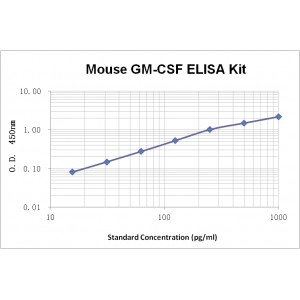More info
Assay Range | 15.6--1000 pg/mL |
Sensitivity | 1.0 pg/mL |
Specificity | No cross-reaction with other related substances detected |
Size | 96T |
Storage | Store at 2 - 8ºC. Keep reconstituted standard and detection Ab at -20 ºC |
Assay Principle | Sandwich ELISA |
Sample Volume | 100 µL final volume, dilution factor varies on samples |
Sample Type | serum, plasma or cell culture supernatant |
Detection Method | Chromogenic |
Kit Components
1. Recombinant Mouse GM-CSF standard: 2 vials
2. One 96-well plate coated with Mouse GM-CSF Ab
3. Sample diluent buffer: 12 mL - 1
4. Detection antibody: 130 µL, dilution 1:100
5. Streptavidin-HRP: 130 µL, dilution 1:100
6. Antibody diluent buffer: 12 mL x1
7. Streptavidin-HRP diluent buffer: 12 mL x1
8. TMB developing agent: 10 mL x1
9. Stop solution: 10 mL x1
10. Washing solution (20x): 25 mL x1
Background
Granulocyte-macrophage colony-stimulating factor (GM-CSF), also known as colony stimulating factor 2 (CSF2), is a cytokine belonging to the GM-CSF family. GM-CSF is secreted by a variety of cell types including macrophages, T cells, mast cells, endothelial cells and fibroblasts. GM-CSF stimulates the growth and differentiation of hematopoietic precursor cells from various lineages, including granulocytes, macrophages, eosinophils and erythrocytes. Mouse GM-CSF is synthesized as a 141 amino acid (aa) residue precursor protein containg a 17 aa hydrophobic signal peptide and the 124 aa residue mature protein. It has two potential N-linked glycosylation sites and two intramolecular disulfide bonds that are essential for biological functions. Mouse GM-CSF is approximately 54% identical to Mouse GM-CSF. The two proteins show no species cross-reactivity.
GM-CSF exerts its biological effects through a heterodimeric receptor complex composed of GM-CSF Rα/CD116 and the signal transducing common β chain (CD131) which is also a component of the high affinity receptors for IL-3 and IL5. As an important modulator of the immune/inflammatory cascade, GM-CSF promotes Th1 biased immune response, angiogenesis, allergic inflammation, and the development of autoimmunity. GM-CSF has been manufactured by recombinant DNA technology and marketed as a protein therapeutic reagent to stimulate the production of white blood cells and thus prevent neutropenia following chemotherapy.


